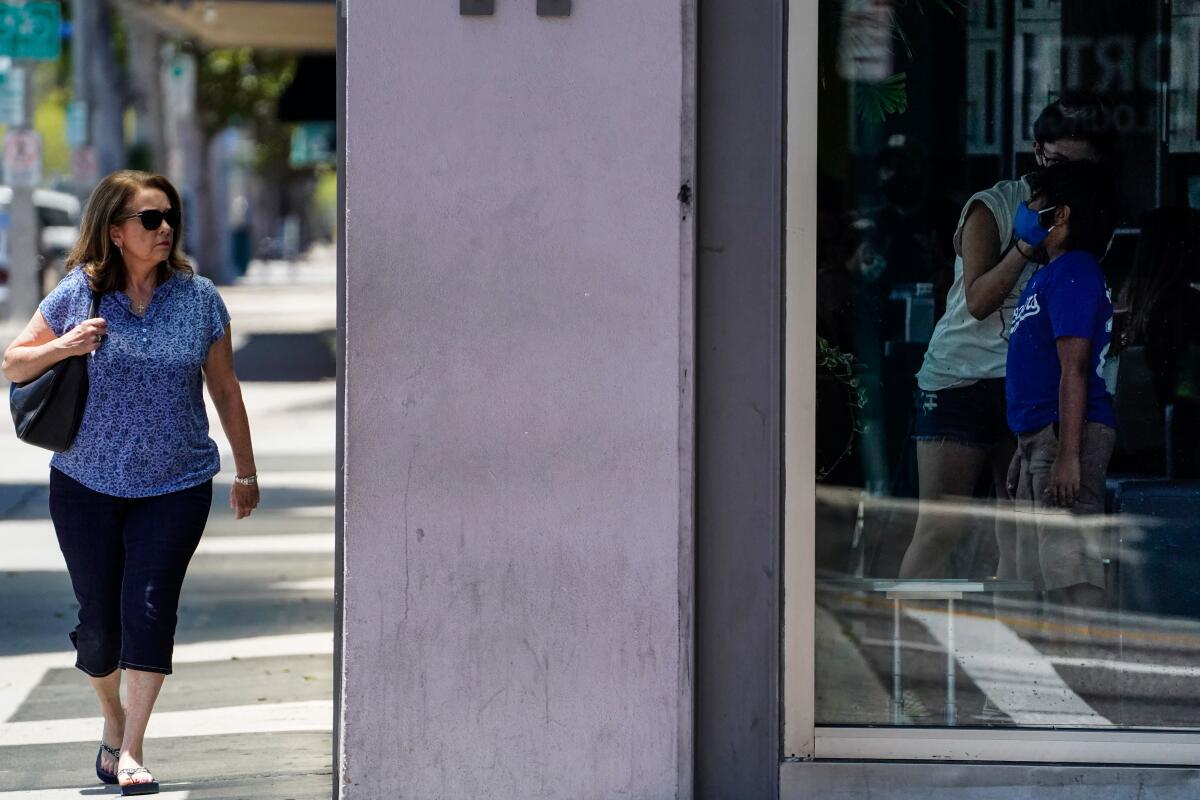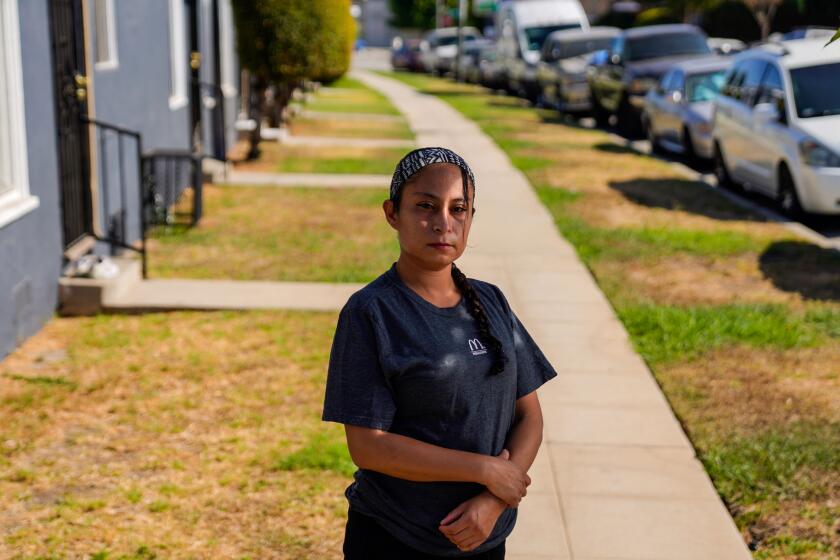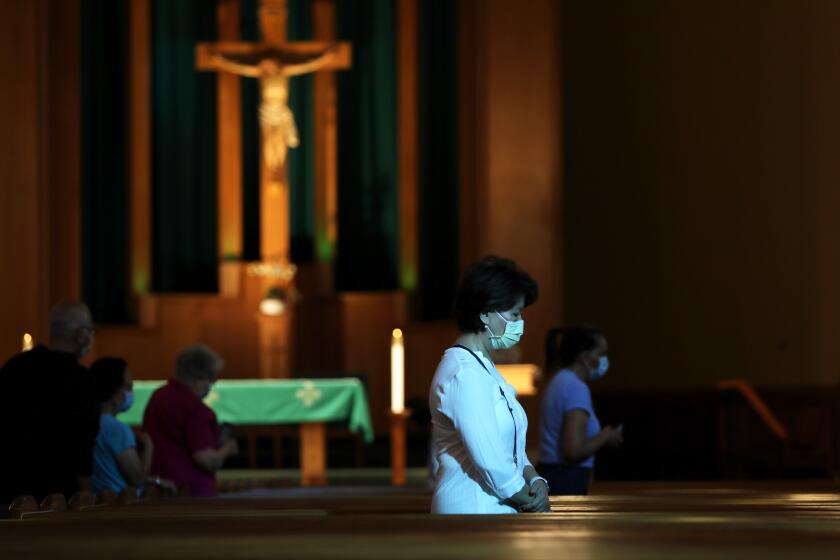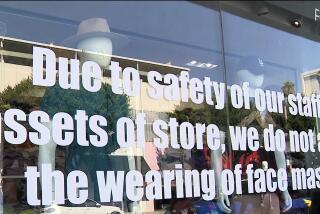Public officials move to muzzle violent outbursts by anti-maskers

Leading public health authorities all but beg people to wear them. Local, state and federal government officials are imploring, and in two-thirds of states, mandating, citizens to don them in public. Even the most mask-averse potential “role model,” President Trump, has intermittently begun sporting one.
The public, according to research polls, itself signals support for government-imposed mask mandates and most people say they are themselves wearing masks to protect others and, to some extent, themselves, from the deadly coronavirus.
Yet surveys by researchers and media organizations including The Times make clear that large numbers of people continue to eschew masks in public, even in locales where they risk misdemeanor charges. As well, videos continue to pop up on the internet showing a handful of shoppers pitching tantrums — or even worse, physically threatening or attacking employees — when told that mask-wearing is mandatory inside supermarkets, shoe stores and cigar shops.
Government upgrades efforts to enforce mask mandates
As public health groups and Democratic presidential nominee Joe Biden push for a federal mask mandate, state and local officials have themselves approved a bevy of regulations to bolster their initial mask mandates.
In Illinois, where a mask mandate was first imposed in May, Gov. J.B. Pritzker signed a law early this month making it a felony to assault retail workers “conveying public health guidance,” such as requiring customers to wear masks or practice social distancing. Pritzker also issued a rule penalizing businesses that don’t enforce mask requirements with fines of up to $2,500.
“We know that face coverings are key to helping prevent the spread of COVID-19, but it only works if everyone wears them,” said Ngozi Ezike, who directs the state’s Public Health Department. “We are seeing cases increasing each day and hearing about people not complying with the masking mandate. This rule is an effort to help keep all of us healthy.”
In Connecticut, an April executive order that all people 2 years and older must wear masks in public spaces was augmented this monthby a requirement that residents who claim to be medically exempt provide a doctor’s note.
Several local governments in California have made businesses and residents subject to fines for not adhering to the statewide mask mandate. After seeing a spike in coronavirus cases, Yolo County code officers can now fine businesses up to $10,000 for not complying with health orders, including not wearing a mask. Likewise, in the city of Glendale, failing to wear a mask in public spaces can cost individuals up to $2,000 for a third violation.
Earlier this week, officials in Charleston, S.C., renewed a mask policy that was approved in June and approved $100 fines for first-time violators.
Some of the state’s largest coronavirus outbreaks have occurred in workplaces, but fear of retaliation is preventing employees from voicing safety concerns, workers and labor organizers say.
What people do vs. what people say they do
Throughout the summer, several polls have signaled that most adults in the U.S. support government mandates and say they use masks when out in public. The Pew Research Center reported in June, for instance, that 65% of respondents said that they had worn a mask in stores or other businesses all or most of the time over the course of the month. In July, an Associated Press-NORC Center for Public Affairs Research poll said that 75% of respondents — including 89% of Democrats and 58% of Republicans — favored wearing face coverings while outside their homes. A Julypoll by the Hill/HarrisX found that 82% of registered voters supported a national mask mandate, including 93% of Democrats and 66% of Republicans. A survey by the USC Dornsife Center for Economic and Social Research also found a steady upward trend in mask-wearing over the last few weeks, increasing from 8 in 10 in June to 9 in 10 in August.
However, researchers at USC also found that even though mask-wearing seems to be widespread, “many people have not been wearing them according to recommended guidelines.” The Times directly observed the behavior of passersby in three major intersections in Southern California and found that many people do not, in fact, wear masks in crowded outdoor spaces — even though failing to wear a mask in public has been a misdemeanor in the state since June.
To date, at least 33 states require the use of masks in public, according to Masks4All, which advocates for the use of cloth masks. Most other states leave face covering regulations up to municipalities. That includes Georgia, whose governor, Brian Kemp, recently withdrew a lawsuit against Atlanta’s mayor and City Council in an effort to block restrictions to combat the coronavirus, including a citywide mask mandate.
How vociferous do some naysayers remain?
In July, a woman at a Skechers shoe store in Oklahoma City expressed her distaste for its mask policy by throwing boxes of shoes at an employee. Shortly afterward, the City Council approved anemergency ordinance requiring face coverings in indoor public places.
But mandates don’t always protect essential workers from verbal, or even physical, abuse.
In mid-August, for instance, a man at a supermarket in Orange County refused to wear a mask while shopping. Then, when an employee asked him to leave the store as a result, he bristled and equated the state’s mask requirement to “Nazism.”
Days before that, a man in Tucson shouted obscenities at employees and other customers at a Sprouts Farmers Market after being asked to wear a mask. To keep the conflict from escalating, his son picked him up and carried him out of the store. Notably, Tucson’s mayor issued a proclamation requiring face coverings in public settings in June.
Also in August, a woman without a mask at a supermarket in Long Island, N.Y. — where face coverings have been required since April — equated the mandate with communism before going on to demean and threaten an employee.
In Bethlehem, Penn., on Aug. 1, police detained Adam Michael Zaborowski, 35, on suspicion of firing a gun at an employee at a cigar shop.
According to the Bethlehem Township Police Department, employees informed Zaborowski that all patrons are required to cover their mouth and nose because of COVID-19. They also said that if he was uncomfortable wearing a mask, they could take his order out on the curb. According to police, “Zaborowski became irate, grabbed two cigars from a shelf and exited the store without paying.”
An employee followed Zaborowski outside, calling for him to return the merchandise. Zabrowski, police said, “turned around, pulled out a semiautomatic handgun and fired one round in the air then two rounds at the staff member.” No one was injured, and Zaborowski fled in a pickup truck. He was arrested after a shootout with state and local police — all this amid a statewide mandate that requires everyone to wear a mask outside the home.
Mask-wearing in public has become an increasingly pressing and politicized issue as the economy reopens and cases surge across the nation.
Carrot and stick?
Utah is among the fewer than 20 states without a statewide mask mandate. Instead, the state government set up an online portal that enabled all residents to request up to six high-quality masks per mailing address — completely free of charge.
“We wanted the masks to be nice, so that people could feel proud wearing them,” said Ben Hart, deputy director at the Utah Governor’s Office of Economic Development. Within weeks of launching the initiative, the state government had about a million online orders — this in a state with about 3.2 million residents.
With the help of the National Guard and religious organizations, state officials also targeted its most vulnerable populations. Masks were distributed to nonprofit groups serving the homeless and delivering meals to the hungry. The “A Mask for Every Utahn” initiative also prioritized residents over the age of 65, those with preexisting health conditions, those who do not speak English as a first language, refugees and those who do not earn a living wage.
“That was really critical,” said Hart, “because you can mandate [wearing a mask] all day long. You can fine people. You can get into a fight. You can confront them on the street. But if they don’t have the money to get a mask, it doesn’t matter.”
Utah state officials also collaborated with 150 grocery stores throughout the state, providing each participating establishment with at least 400 masks. In regions where coronavirus transmission erupted, grocery stores received up to 2,000 masks. They were offered for free to customers, who could take them and use them elsewhere.
Utah has now distributed 2.8 million masks at a cost of about $15 million dollars. Pointing to the state’s comparatively low COVID-19 mortality and unemployment rates, he believes the investment “was worth every cent.”
Public perception, Hart added, is important. Underscoring that though some people still refuse to buy in to mask-wearing, many have been convinced through multilingual education campaigns, and, especially, the state government’s willingness to spend money on masks.
“It’s about telling our citizenry: ‘We care enough about you to help you understand the why and also give you access to resources,’” he said.
“Our perspective here in Utah is that we really do favor providing resources and helping people understand the importance, as opposed to a mandate. But we would never criticize a government that’s done that because there’s data that shows that it works. The question is: Are there even more effective ways to encourage people to wear masks? Do you want to help people with incentives, or do you just want to regulate?
Yet despite Utah’s successes, he added, “It’s hard to argue against” a federal requirement, given that “there are still a lot of states where people aren’t wearing masks.”
In fact, even Utah applies state-level force in K-12 schools. Earlier this week, students and staff learned that they can be charged with a misdemeanor if they don’t wear masks in school. The move, celebrated by the Utah Education Assn., is unpopular with parents who say they oppose criminal prosecution of minors.
More to Read
Sign up for Essential California
The most important California stories and recommendations in your inbox every morning.
You may occasionally receive promotional content from the Los Angeles Times.













